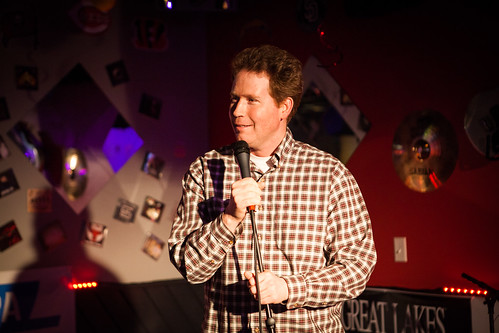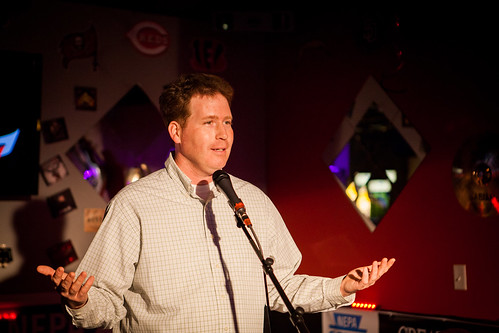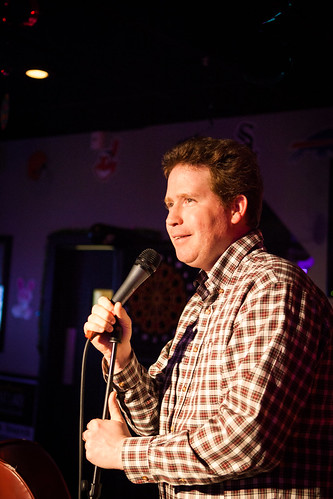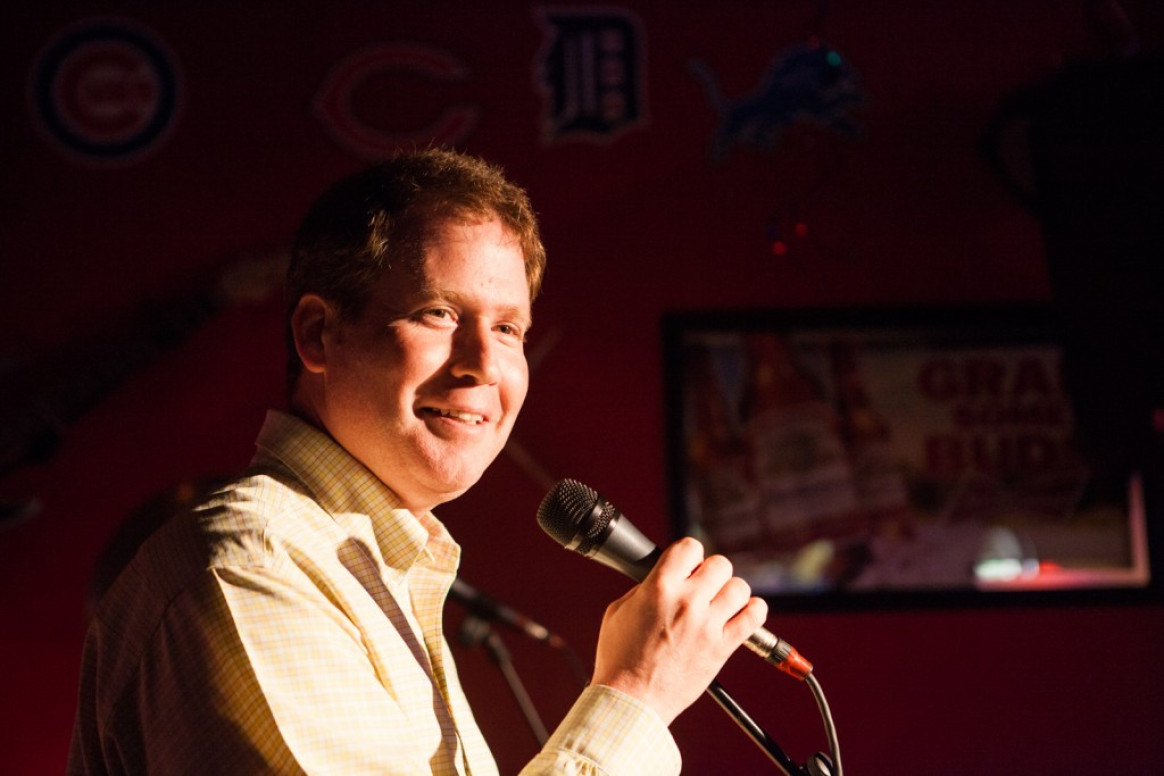When they’re starting out, most comedians have to work some mundane day jobs unrelated to their dream profession to get by – it’s just part of paying their dues.
But for Joseph Bryan, his job not only serves as the inspiration for his jokes, it’s become part of who he is and what he’s known for on stage.
Sitting down with NEPA Scene in the corner of the Market Café in Wegmans in Wilkes-Barre on his day off, he’s eager to tell us about Checkout Joe, the guy who tells “punny” jokes about customers and food products in clubs and bars across Northeastern Pennsylvania, but we want to get to know regular Joe first. As it turns out, they’re practically the same guy, and that’s by design.
Bryan was a native of NEPA up until third grade – his father’s job moved the family everywhere from Texas to New Jersey to nearby Pottstown before he settled back in Wilkes-Barre. He grew up watching VH1’s “Stand-Up Spotlight” with Bobby Collins and was struck by how comedy was able to take away anyone’s problems, even for just a few moments, so when he studied theater at the University of Notre Dame, he entered a comedy competition held there during his sophomore year and came in third telling funny stories about his family, giving him just enough confidence to try it again sometime.
“I felt like, ‘OK, maybe I can do something here. Maybe there’s hope. Maybe this is for a good reason. Maybe there’s something there,’” Bryan began.
 |
“It’s one of those things where you feel nauseous sometimes, but when you get off the stage, it’s such a great feeling, like you’ve done something or accomplished something. And hopefully it made some people laugh.”
After graduation, he got his official start at the Comedy Cabaret in Philadelphia, but even now at 40 years old, he’s continued his education by taking improv classes at the Upright Citizens Brigade Theatre and acting classes at The Barrow Group in New York City, commuting back and forth by bus.
“In improv, they tell you don’t be funny, just be yourself. Act normally. If you act in a normal fashion, the funny is going to come out. Eventually you will find what’s funny without forcing it, without trying to be jokey or going for the easy laugh,” he noted.
“You learn to be yourself. You learn how not to always try to be funny. You just try to be honest, I guess, and if you’re honest in life and in situations, you’ll find what’s funny in things.”
That may be what makes Bryan so likeable – there’s a humble honesty in his humor that one can’t help but enjoy. So why go by the stage name Checkout Joe? Why build a brand – a name brand, of course – around that? With the familiar sounds of checkout beeps and rustling bags in the background, he told us how friends, church, sitcoms, positivity, and a whole grocery list of other things influenced the creation of NEPA’s favorite clerk.
Welcome to Wegmans
As some of today’s biggest comedians continue to push the envelope of censorship and what can and cannot be said, Checkout Joe is keeping as clean as the floor in aisle six – a sensibility he attributes to comedians like Jerry Seinfeld and Paul Reiser, who both made a name for themselves through network sitcoms and curse-free observations, paying close attention to their writing styles. It was a bit too close at times when he was starting out, however, so a friend pointed out the obvious.
“I was trying to find my way or my voice, I guess you could say, and just a friend from church said, ‘You’re working as a cashier. Why don’t you just own that and embrace that and find the silver lining and your voice through that because that’s who you are and that’s what you’re doing?’” Bryan recalled.
“I just wanted to go home and kind of forget that part. In the most unexpected place, you can find yourself and who you are. I’m glad that I stuck it out because I thought about quitting at times and finding something else, but I think it kind of works for me right now.”
He spent about eight months writing and developing ideas before he was ready to debut his act. After tossing a few names around, it came down to either Cashier Joe or Checkout Joe, so he chose the one that had the better ring to it. With Joe, the pun is always intended.
“I usually end with, ‘I’ve got one more joke before I’ve got to check out of here,’ or, ‘Next week, check out Joe,’ like watch him or check this guy out. Checkout just seemed to get more mileage,” he said, keeping his own first name, along with his approachable personality.
“I didn’t want two different personas. It just seemed like a lot of work. I didn’t want to have to gear up for something on stage. I just wanted to be myself. It’s not like I did research on how to be a checkout guy; it’s what I’m doing. [My friend] wanted me to be much more high-energy, but that’s not really me; that’s not who I am.
“I would say I’m pretty much who you see up on stage. That’s pretty much who I am, a side of me. It’s not an invented side because I want to be real. I think people can see if you’re trying to be fake or phony. I didn’t want to do that. Pass or fail, good or bad, I wanted to do it as me, whatever that is.”
For now, he’s a front-end cashier, which gives him some time to interact with customers and punch out with more than a few amusing anecdotes.
“A woman came through my line, and the price was like $19.67, and she goes, ‘Wow. That’s the year I was born. I couldn’t do that again if I tried.’ I’m thinking, ‘All you have to do is buy the same items next time. If you look in your cart and you buy those same exact items, it’s going to come to $19.67.’ It’s not really rocket science here,” he joked.
“That always gets me when people say things like that.”
Essentially, it’s paid research, and he feels Wegmans does live up to its reputation as one of the best companies in the country to work for, granting him time off and a flexible schedule to pursue his comedy. While he’s no doubt a dreamer, he still picks up on the little things, particularly if they come through his line.
“A woman was using coupons, and I saw on the bottom that it said that you could only use this for the items expressed and any other use constitutes fraud. I’m thinking, ‘Fraud? Really? For misusing a coupon?’ Imagine going to jail for that. What are you in for? Murder. You? Bank robbery. What about you? Coupon fraud. I tried to buy the 12 oz. box of cereal instead of the 18 – you don’t want to mess with me.”
It’s his puns that he’s best known for, however, though they became part of his act almost accidentally. While his friend kept pushing him to play a character on stage, Bryan felt that he could be memorable in some other way.
“I’m the Pun-isher,” he cracked.
“It’s a thing now that people will remember, but I still thought to myself, ‘How do I come up with jokes? How do I write jokes about a grocery store?’”
 |
Comparing his wordplay to Jeff Foxworthy’s redneck jokes or Larry the Cable Guy’s “Git-R-Done” catchphrase, he knew that “you have to have something” to make a lasting impression.
“It’s a great way to make people laugh. I always hear people tell stories, but I never really would understand the stories or I never understood where the joke part was, but I thought if you could take a story and throw a little pun or wordplay into it, that can really punch it up a little bit. People seem to look for it or expect it,” he said.
“When you do it, people will try to think up their own. I’ll do puns and people either during the show or after the show will come up to me with puns – and I’ve used them! It’s kind of fun to see the wheels turning when I’m doing my puns because they’re like, ‘Where’s he going with this?’ or ‘Where else can you go with this?’ I kind of like that. I think it’s pretty cool.”
This also made it easier to stay clean, which was important to him after learning that Seinfeld used to curse until he realized that his jokes weren’t really funny without all the swearing. Bryan wanted to write genuinely witty material that he could present to any audience.
“I started out doing a lot of churches, and having a Christian background, I thought it was probably good to stay clean. People always say you can work more and find more opportunities as a performer. I’m sure if I wanted to I could dirty it up a little bit. It’s easy to be clean and tell a few off-color jokes than it is to be really, really dirty and then try to be clean. It doesn’t really work that way,” he explained.
“That’s just not really the avenue that I wanted to go down. That’s why I thought maybe the puns would be more of a way to punch things up without being dirty.”
And besides, at the end of the day, even the customers aren’t all bad, so not every punchline could be about them.
“People are great. It’s nice to be recognized as well,” Bryan said.
“People come in and they say, ‘We saw you at The Woodlands,’ or ‘We saw you at Mohegan Sun. You really are a cashier!’ That’s pretty cool when they like you and say that you’re doing a good job.”
Yes, more Mr. Nice Guy
In writer/director Kevin Smith’s 1994 indie film debut “Clerks,” the titular characters are famously portrayed as pissed-off slackers who are angered by the rudeness and stupidity of practically everyone who shops at the Quick Stop. This may accurately portray many register jockeys, but not Bryan – his demeanor on and off stage is quite the opposite, actually.
“I feel like life’s too short. I don’t know. Maybe if I’m 50 or 60 I might be more angsty, but right now, it just seems like it takes a lot of energy to be angry. Even things that frustrate me, I try to put them in a fun way because it is comedy,” he emphasized.
“Coming from Jerry Seinfeld and Paul Reiser and those guys that I really enjoyed, I didn’t get those guys as riffy or angry, or anyone else that I may have been influenced by. I don’t even know how to write that way because I don’t think it’s really a part of me or my personality. I just try to be more fun-loving, smiling.”
Sometimes this involves turning a negative situation into a positive bit.
“You can let things get on your nerves very quickly, and it can be the smallest thing that people don’t even think about. Sometimes you get customers that just throw their money at you or something like that. Sometimes you feel subservient, less than. You feel like people are like, ‘Oh, he’s just a cashier,’” he admitted.
 |
“Or you’ll be bagging and halfway through bagging the groceries, they’ll be like, ‘Oh, can you use the one I brought from home?’ How about telling me a little bit earlier? How about that? Sometimes that can be a little bit nerve-racking, but I try to turn that into a positive thing, and people can identify with that. Sometimes even before I get to the punchline, people start laughing because they’re like, ‘Oh, that’s me. I do that.’ If I come across in a negative way, that might turn people away or not be received as well.”
His nice guy attitude comes from more than just customer service – it may have been ingrained in him at any early age as he and his family moved from town to town, having to make new friends again and again.
“When you move a lot, you have to find a way to fit in or defuse whatever situation that you find yourself in as a new student in a new school. Being an athlete is one way to get yourself in there, and just having a sense of humor about things and not taking things too seriously is a way too. That probably formed part of what I do,” he mused.
“No one wants to be around the angsty guy anyway, especially if you’re new. Maybe it has more of an influence than I thought because when you meet a new person, you have to jovial, really. No one wants a new person coming in and being a jerk, right?
“It’s not the most stable at times, but you find humor in life.”
That humor has gone over well at clubs, colleges, casinos, bars, benefits, and churches, making him a finalist in the Clean Comedy Challenge in Ohio in 2011, though it does bewilder some who are expecting more traditional stand-up.
“Sometimes you can get people that don’t see it as the best level of stand-up comedy. I’ve had it where it’s gone really well and the next week it’s like, ‘No. Just no.’ I’ll be honest – I’ve had both reactions,” he pointed out.
Yet those off moments don’t discourage him – due both to his positivity and his improv training.
“Improv just gave me confidence that if somebody says something in the audience or something happens, I could recover. I wouldn’t falter or be nervous or scared. I think it just gives you a great confidence that if I could go up there and create something from nothing, just a few ideas, I could definitely do very well with my routine in mind,” he said.
“That’s what I’ve enjoyed about this journey. It’s just a part of me and who I am and what I do. It’s just about finding myself and hopefully making people laugh along the way.”
Staying fresh
Out of his six years as a Wegmans employee, Bryan has spent over two as Checkout Joe, and while that time has served him well, he seems ready to move on with ideas too big to fit into a grocery bag. Ready with a full hour of material and currently taking creative writing courses at Wilkes University, he’s turning his light, upbeat comedy routines into short stories that will eventually become a book. He has also taken up screenwriting, developing ideas for a potential TV show or Netflix series.
“You can always learn new things. I don’t want to get too stale,” he said.
“‘The Office’ was successful. Why not a show about a supermarket?”
He already has some experience in that realm, acting in the cult comedy film “Wet Hot American Summer” and an episode of “The FBI Files” on Discovery Channel, even serving as an extra in “National Treasure.” There are no small parts, as they say, and Bryan fits his well, sporting a brand new “uniform” with an embroidered Checkout Joe logo on it that includes a little grocery bag with laughter coming out of it.
“I’m starting to feel more official because they say, for branding purposes as a performer, you want to be consistent with the look and you want people to identify you. I’ve got my khaki pants; I’ve got my navy blue polo with my name sewn in,” he noted.
“Overall, I feel like I’ve got really good feedback from people. I feel like there could be something bigger there than just Checkout Joe. I’m hoping. That’s what you have to do; otherwise, what’s life all about, right? You have to hope and believe that something great will come about.”
Photos by Alex Seeley Photography, taken at NEPA Scene’s Got Talent at Thirst T’s Bar & Grill
by Rich Howells
Rich is an award-winning journalist, longtime blogger, photographer, and podcast host. He is the founder and editor of NEPA Scene.


